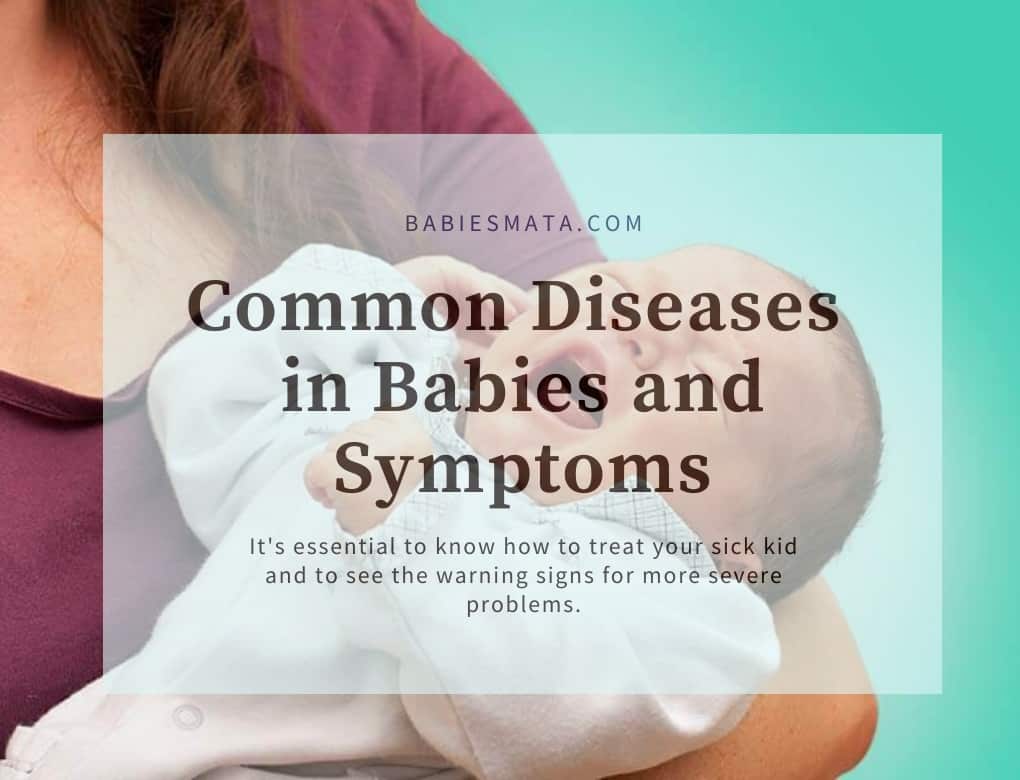Common Diseases in Babies and Symptoms

It\’s hard when your child\’s sick. Common health issues in infants include colds, coughing, nausea, and vomiting. Babies often commonly have skin problems, such as diaper rash or cradle cap. Most of these things are not extreme. It\’s essential to know how to treat your sick kid and to see the warning signs for more severe problems. Here are common diseases in babies;
RSV (Respiratory syncytial virus)
The respiratory syncytial virus affects the lungs. Children under the age of 2 are more prone. In most cases, symptoms are relatively minor and reflect those of a cold. Yet preemies and children who have a weakened immune system, a congenital heart defect, or chronic lung disease may get severe in a hurry, causing either bronchiolitis (a small airway infection in the lungs) or pneumonia.
Around 150,000 children are admitted every year due to RSV, according to the Centers for Disease Control and Prevention. Seek medical attention from your pediatrician right away if your child is wheezing, breathing very rapidly, or unable to breathe fails to drink something, seems to be excessively lethargic, or starts to grow starts to develop a pinkish tint on her lips and in her mouth.
Roseola
It\’s usually over two years of age, so it\’s always kindergarten. The chances are that the effects of your child\’s Roseola will be so mild that you won\’t even know it\’s under the sky. Many babies, however, have a high fever, vomiting, coughing, and, later, a patchy rash that begins on the chest and spreads. While Roseola normally takes place within a week, please contact your pediatrician if your child\’s fever is higher or longer than three days. In the meantime, ease his pain with children\’s ibuprofen and keep him at home until the rash fades.
Gastroenteritis
This condition, also known as the stomach bug, causes vomiting, diarrhea, and abdominal pain. A variety of viruses, including noroviruses, which often run through child care centers (not to mention cruise ships), can cause gastroenteritis. Most stomach viruses can clear up within a few days to a week and need nothing more than rest and TLC.
Also, make sure your child consumes enough fluid to avoid dehydration. If your child likes juice, water it by half as these drinks are high in sugar and may exacerbate diarrhea. When she feels like feeding, give her small quantities of bananas, pasta, apple sauce, and toast (BRAT diet). If she holds them down, she\’ll gradually go back to daily meals. You could try to feed her Greek yogurt, too. It is high in probiotics (which encourage healthy flora in the intestine) and contains less sugar than the standard form.
Related Article: How to Treat Diarrhea in Infants
Coxsackievirus (painful sores in the mouth and throat)
Coxsackievirus occurs primarily during summer and fall and is extremely infectious, spreading from child to child by contact, coughing, sneezing, and fecal matter. Red blisters also follow the sores on the hands and soles of the legs that last seven to ten days. When your child still feels achy, give him or her children ibuprofen or acetaminophen. Ease your sore throat with ice pops and cold drinks, but avoid acidic juices that can sting. You should also watch for dehydration, as some children\’s sores are so uncomfortable that they can resist drinking.
Slapped cheek syndrome
Children 3 and younger are the most susceptible to the fifth disease, which produces a bright red rash on the cheeks. The child does not have any other signs of sickness. Still, she may also have a moderate fever, a runny nose, and a small, lacy-looking rash on her abdomen. Five diseases frequently spread like wildfire across kindergartens and preschools. If the rash comes out, the kid is no longer infectious, so it\’s going to go down on its own. A small percentage of the children who receive it will experience joint pain (let your doctor know if it happens immediately). Also, contact your ob-gyn if your child has the fifth disease while pregnant, as the virus may cause complications.
Strep Throat
Young children are more likely to become infected with streptococcal bacteria if their older sibling has a disease. While strep spreads mainly through coughs and sneezes, your child can also get it by touching a toy played by an infected child. The classic symptom is a pain in the throat, which can be so intense thatIt can be hard to swallow or even speak.
It can develop a fever, swollen lymph nodes, with abdominal pain. Contact your doctor if you notice your kids can develop fever, sinusitis, with abdominal pain. When you suspect that your child has gastroenteritis, contact your doctor. A quick examination (which does not pick up any strain of tonsillitis) and a culture of the throat (which takes 48 hours but is definitive) can be performed. When the test is positive, antibiotics are likely to make your child feel better. Leave it at home for at least another 24 hours after the first dose to minimize the risk of transmitting the bacteria to someone else.
Influenza
Flu is hard and fast: fever of up to 103 ° F, body aches and chills, headache, sore throat, cough, and occasionally vomiting and diarrhea. It\’s a miserable winter-time disease that sometimes lasts more than a week and can lead to severe complications, including pneumonia.
Luckily, you can significantly minimize your child\’s risk by scheduling an annual flu vaccine that can be administered as a shot or, for children over 2, as a nasal spray. The vaccination is not foolproof (because the strains of the virus differ from year to year). Still, if it gets influenza despite being vaccinated, the symptoms will be much less extreme. If you notice your child has the flu, make an appointment with your pediatrician right away.
Related Article: Signs your Baby is Malnourished
Conjunctivitis
This inflammation of the tissue lining of the eyelids (also called the Pink eye) causes redness, yellowish discharge, blurry vision, and crusty skin. In younger children, pinkeye is most commonly caused by a bacterial infection that is treated with antibiotic drops. (Note: It can also result from a condition that does not need any treatment, allergies or irritants in the environment that can be handled with a drug). Your baby will not attend class until he or she has been cared for at a minimum of 24 hours. Make him wash his hands frequently and stop rubbing his face and sharing napkins, blankets, or pillows so that he won\’t harm someone else in your house.
Pinworms
If an infected child scratches her butt and she doesn\’t clean her hands, she can easily pass them on to other children (who get sick if they put their hands in their mouths). Eggs travel down the digestive tract, hatch, and lay eggs around the anus (yuck!). The doctor will give you special tape for affixing at night and check it for pinworms and eggs. Just one or two doses of prescription medications are required to get rid of them. But you\’re going to have to wash her towels and bedding in hot water. See your doctor if you find that your child is scraping the bottom of it.
Many childhood diseases reached their peak without any big concern. However, some indications (and some children) can warrant consultation with your doctor. Watch for:
- Dehydration: Your baby may have swollen eyes (or, if he\’s a boy, a plume, or a soft spot on his head) or look excessively irritable, or his mouth may be sticky or tacky to the touch.
- High fever: In infants, any high temperature warrants a call. For newborns 3 to 6 months of age, phone when the rage is 101 ° F; for older infants and young children, the level is 103 ° F.
- Breathing difficulty: Call right away if your infant is wheezing, breathing quickly, or you experience awkward pauses between his breaths.
- Not eating: It\’s common for a sick kid to have little real interest. But if your kid eats or consumes less than half of what it would usually have been for two days or longer, consult your doctor.
- Preexisting conditions: If your baby has been diagnosed with asthma, diabetes, a compromised immune system, or any other severe medical ailment, speak to your doctor any moment he or she encounters a virus that might affect his or her wellbeing.
The key to a healthy child is a strong immune system through a HEALTHY MEAL PLAN.








